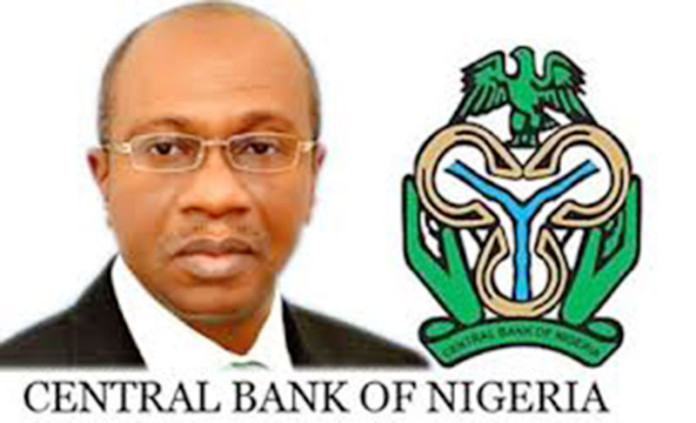By Jeph Ajobaju, Chief Copy Editor
Hints of the positive disposition of Aso Rock to Godwin Emefiele were dropped last month by Lai Mohammed when he disclosed that Abuja is not in a hurry to scrap multiple exchange rates for the naira.
The policy, fleshed out by Emefiele in 2015, a year after he became CBN Governor, is delivering results, said the Information Minister, who is also in the inner cacaus of President Muhammadu Buhari.
Yet Buhari nominating Emefiele for a second term of five years on May 8, 2019 came as a surprise, given that nearly all sensitive posts in the president’s administration are occupied by Northerners.
Plus the fact no CBN governor has served two tenures in the past two decades.
Buhari has asked all ministers to resign for him to reconstitute his cabinet for his own second term beginning on May 29.
He may as well have renominated Emefiele to signal plans to redress the imbalance of filling top posts, including those of 13 security agencies, with Northerners.
That may not hold, however, because some speculate that Buhari reappointed Emefiele because the president likes both the man and his policies, even though the economy keeps struggling.
Apart from multiple exchange rates for the naira, the CBN also props up the naira against the United States dollar.
“Right now, the currency is converging naturally at about 360 naira to the dollar. Three years ago, [it] was about 525. I don’t think the Central Bank is in a hurry” to change this, Mohammed said on April 18.
“Inflation is down and the reserves are up. We are in a better position to defend the naira.”
There are at least three different exchange rates to manage pressure on the naira – the official rate of the CBN, interbank rate, and the rate at bureau de change (BDC).
Mohammed said the official rate of 306 to the dollar is working well.
In March, the official market supported by the CBN hovered around 306.90 to the dollar.
The CBN regularly injects dollars into the foreign exchange (forex) market to stabilise the naira.
Currency controls were introduced in 2015 to counter the impact of falling prices for crude oil, which provides 95 per cent of Nigeria’s forex earnings.
Controls restrict access to U.S. dollars, choke off investment, and the International Monetary Fund (IMF) wants Nigeria to scrap the multiple rates.
Buhari is not in favour of that, and Emefiele tilts towards his boss.
Surviving the hawks
Nigeria’s consumer inflation rose to 11.37 per cent in April, up from 11.25 per cent in March, the National Bureau of Statistics (NBS) disclosed on May 15.
The food price index jumped to 13.70 per cent from 13.45 per cent.
That notwithstanding, it is a breath of fresh air that Emefiele has survived the onslaught of hawks, among them Buhari’s supporters, whose motive is to ride on their link with him to grab everything for the North.
Buhari’s support groups, comprising all his 2019 campaign support organisations, is not happy with Emefiele’s reappointment, saying he does not merit a new tenure.
A member of the House of Representatives, Muhammed Gudaji (APC, Jigawa), spoke in Abuja on May 15 on behalf of the groups.
He advised Buhari to take a personal interest in all appointments, as he must have been misled by people close to him to extend Emefiele’s tenure.
“The reappointment was very surprising and we are against it because we believe Emefiele did not deserve it,” Gudaji said.
“It is our believe that some trusted people, very close to … Buhari must have misled him by painting a positive picture of Emefiele while hiding the many wrong things that occurred under the man’s watch.
“These people that Buhari trusted and [who are] very close to him only took advantage of the fact that once he trusts you, there is no going back.
“But looking at Emefiele’s performance during the administration of President Goodluck Jonathan, today Diezani Allison-Madueke, former NSA Sambo Dasuki and former Finance Minister Nenadi Usman, among several others, are under … investigation … bordering on looting.
“Emefiele as the governor of CBN was there when those people were doing all they wanted with the dollar, looting the treasury under his supervision.
“What are we saying, if Emefiele is reappointed, then all those accused of looting the treasury should be set free too.
“This is a CBN governor that met the exchamge rate at N180 to a dollar, what do we have now, it’s N360 to a dollar and he could not do anything about it for almost four years.
“There is no confidence that the rate would come down after four years, and he has not shown any capacity to turn things around.
“The support groups are not convinced about the capacity of Emefiele to turn the economy around.”
Gudaji advised Buhari to examine closely people shortlisted for appointment.
“We say this because we are afraid that if this persists, it is a signal that incapable people might also be returned or chosen in the next dispensation. It is next level we are going to not back level.”
Nigeria runs itself on oil exports and has failed for decades to diversify the economy. That cannot be blamed entirely on a CBN governor, or on any one single government agency.
Fleshing out the economy to produce in all sectors demands the political will of the president in collaboration with the legislature.
CBN performance under Emefiele
Below is the take of Bloomberg on how the CBN has performed under Emefiele and how it may continue to regulate the economy within the structures created by the government:
Emefiele looks set to get a second term as Nigeria’s Central Bank governor, which would make him the first person to do so in the 20 years since Africa’s biggest oil producer ended military rule.
The 57-year-old former banking executive proved controversial in his first five years as monetary chief.
Many analysts criticised his desire to keep a strong currency and curb imports, saying it deterred foreign investment and slowed Nigeria’s economic recovery after the 2014 crash in crude prices.
But he endeared himself to Buhari, who believes the Central Bank’s measures are the best way for Nigeria to diversify from oil and boost manufacturers and farmers.
Here is what investors need to watch under Emefiele’s second tenure.
The naira
Whether or not Emefiele scraps a system of multiple exchange rates and lets market forces have more sway over the naira is a key question for foreign investors.
Under Emefiele, the Central Bank has pegged the naira’s official price at 305 per dollar, while allowing investors to trade it in a separate window at around 360.
Watching to see if Emefiele unifies naira’s rates
The IMF has long said the absence of a single exchange rate hinders growth and makes for an opaque system.
Moreover, Renaissance Capital says the currency is overvalued even in the market window – where its price has barely budged in the past 18 months, thanks in part to Central Bank meddling – and should be almost 20 per cent weaker at 440 against the greenback.
There is little sign that Emefiele or Buhari will change their stance soon. And with foreign reserves having risen 8 per cent since November to $45 billion, the governor has the firepower to defend the currency for longer.
Carry
bonanza
Emefiele has been a godsend for carry traders this year.
His policy of keeping a tight grip on the currency and yields on short-term bonds elevated has made the naira one of the juiciest bets in emerging markets.
Naira bonds have returned 10 per cent in dollar terms this year, the fourth-best performance among major developing nations, according to data compiled by Bloomberg.
High carry
Nigeria’s been a good bet for carry traders this year.
Source: Bloomberg Barclays EM Local Currency Government Universal Index.
The problem for carry traders is that Emefiele may have to change tack at some stage, given that a combination of an overvalued currency and high interest rates high is hardly conducive to boosting one of Africa’s slowest-growing economies.
Reflecting investors’ concerns about growth, the stock market has dropped 8.5 per cent this year, one of the worst performances globally.
Inflation
Can Emefiele bring the inflation rate down? It’s been above the Central Bank’s target of 6 per cent to 9 per cent – which he barely refers to these days – for almost four years.
It’s fallen from a peak of almost 19 per cent in early 2017, but still stands at 11.3 per cent.
It will probably average 11.5 per cent this year, the most after Egypt and Angola among big African economies, according to a Bloomberg survey.
Prices rising
Nigeria is forecast to have one of Africa’s highest inflation rates this year.
Source: Bloomberg surveys of economists.
Monetary policy rate
Nigeria’s main interest rate, known as the monetary policy rate, has become largely irrelevant under Emefiele, given his prioritisation of short-term securities and the cash-reserve ratio (currently set at 22.5 per cent of banks’ deposits) to control liquidity.
If the MPR regains its importance, that would be a sign Emefiele is returning to more orthodox monetary policies, and may perhaps even be a step toward unifying the naira’s various rates.
Rice farmers
Emefiele has increased the Central Bank’s development-finance activities, which include subsidised lending to farmers and manufacturers.
He says such measures have helped provide millions of jobs and are a way to support the economy’s industrialisation.
Critics, including the IMF, say the schemes are prone to corruption and distract the Central Bank from its core function of maintaining price stability.
Spats with foreign companies
Emefiele unnerved investors last August when he said that South Africa’s MTN Group had illegally repatriated $8.1 billion of dividends from Nigeria and insisted it be returned.
The company was cleared of wrongdoing after four months of negotiations.
But the spat dented Emefiele and the Buhari administration’s claims that they would improve the business environment for foreign firms.













